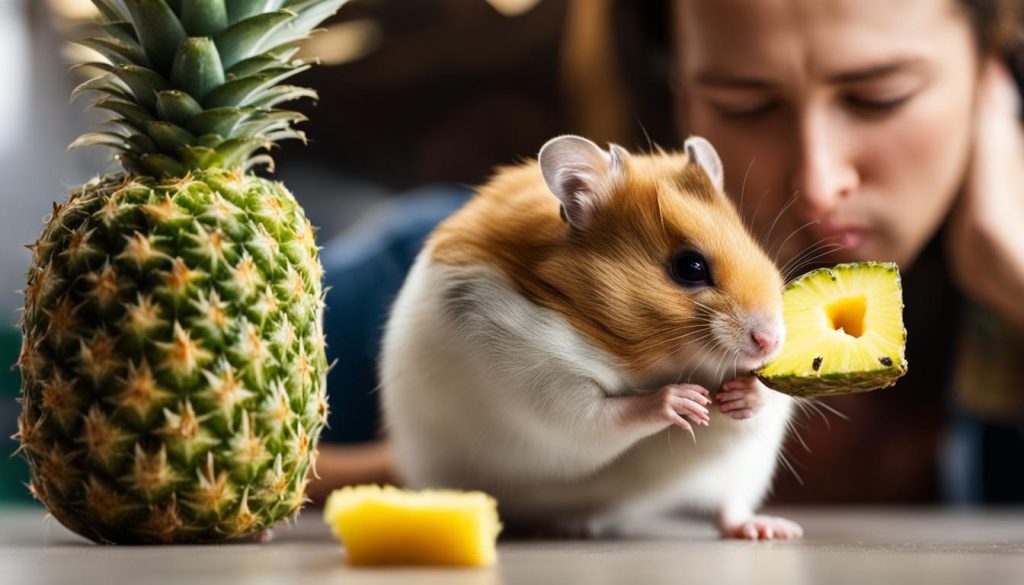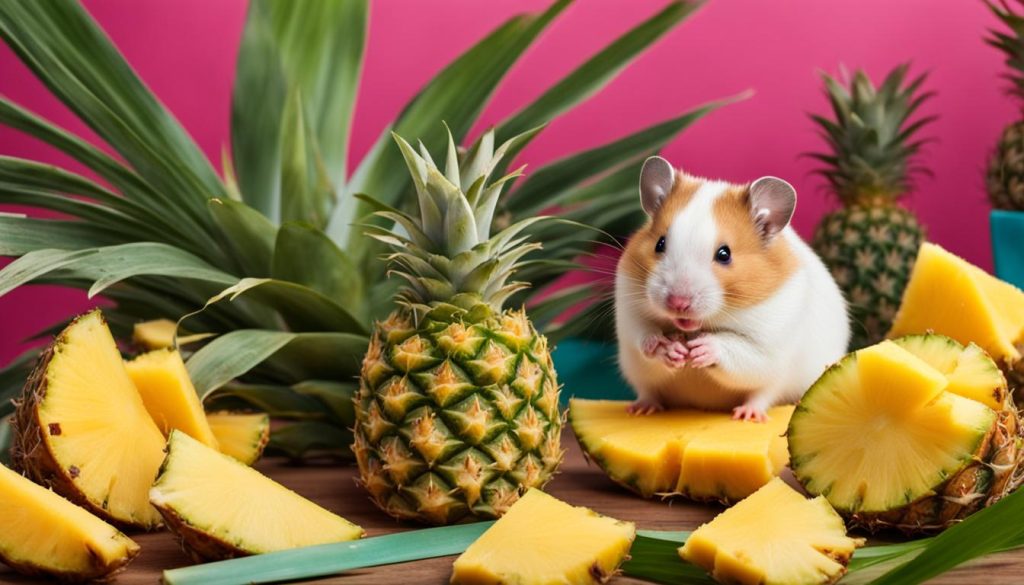Hello, fellow hamster enthusiasts! Today, I want to talk about an interesting topic that often pops up in hamster care discussions: Can hamsters eat pineapple? As responsible pet owners, we always want to ensure that we provide our furry friends with a safe and balanced diet, so let’s dive into the world of pineapple and hamsters.
When it comes to incorporating pineapple into a hamster’s diet, it’s essential to understand the dos and don’ts and make informed decisions. While pineapple can be enjoyed by our little buddies, it should be given in moderation as a treat rather than a staple food. This is primarily because pineapple has a high sugar content that may lead to weight gain, digestive issues, and a lack of other vital nutrients.
To safely introduce pineapple to your hamster, it’s crucial to offer small pieces no larger than their paw. Once every couple of weeks is an ideal frequency to prevent overconsumption. Remember, moderation is key!
Can Hamsters Eat Pineapple? Yes, they can. But in small amounts and not a part of their diet.
- Hamsters can eat pineapple, but it should be offered as an occasional treat.
- Pineapple has a high sugar content, so it’s important to offer small pieces and limit the frequency to prevent health issues.
- Be mindful of your hamster’s reaction to pineapple, and consult a veterinarian if any negative symptoms occur.
- Fresh pineapple is recommended, while canned pineapple packed in syrup should be avoided.
- Always prioritize a balanced and varied diet for your hamster, including other safe fruits and vegetables.
By following these safe feeding tips, you can ensure that your hamster enjoys the occasional pineapple treat without compromising their health and well-being. Remember, a happy and healthy hamster is a joy to have as a companion!
Health Benefits of Pineapple for Hamsters
Pineapple can offer some health benefits for hamsters. It contains vitamin C, which can support their immune system, and manganese, which is important for bone development and wound healing. Pineapple also contains antioxidants that help protect cells from damage. However, it’s important to note that hamsters can produce their own vitamin C, so it’s not essential in their diet.
Hamsters may enjoy pineapple as a delicious treat, but it should be given in moderation. Too much pineapple can lead to weight gain and digestive issues. You should offer small pieces of pineapple, no larger than the hamster’s paw, and only give it once every couple of weeks. Remember to monitor your hamster’s reaction to pineapple and consult a veterinarian if any negative symptoms occur.
By providing pineapple as an occasional treat, you can introduce some variety into your hamster’s diet and offer them a taste of tropical goodness.
Risks of Pineapple for Hamsters
While pineapple can be a tasty treat for hamsters, it’s important to be aware of the potential risks it poses. One of the main concerns is the high sugar content in pineapple. Hamsters have a small digestive system that is not designed to handle large amounts of sugar. Consuming too much pineapple can lead to weight gain and obesity over time, which can have negative impacts on their overall health.
Another risk of feeding pineapple to hamsters is its acidity. Pineapple has natural acids that can cause digestive issues and potential upset in their sensitive stomachs. This can manifest as diarrhea, stomach discomfort, or even vomiting. It’s important to introduce pineapple gradually and monitor your hamster’s reaction to ensure they can tolerate it well.
Moreover, overindulging in pineapple can result in a lack of other vital nutrients in the hamster’s diet. While pineapple contains some beneficial vitamins and minerals, it should not replace their staple diet of hamster pellets and fresh vegetables. It’s crucial to maintain a well-balanced and varied diet to ensure optimal health for your furry friend.
To minimize the risks, always offer pineapple in moderation and as an occasional treat rather than a regular part of their diet. Remember to provide small, bite-sized pieces of pineapple to prevent choking hazards and make sure to remove any uneaten fruit from their enclosure to prevent spoilage.
Note: To get a visual representation of the risks associated with pineapple, take a look at the image below:

How Much Pineapple Should You Feed Your Hamster?
When it comes to feeding pineapple to your hamster, it’s important to consider the portion size to ensure their safety and well-being. A good guideline is to offer a piece of pineapple that is no larger than your hamster’s paw. This ensures that they can easily handle and consume the fruit without any issues.
Pineapple, although tasty and nutritious, should still be considered a treat for your hamster due to its high sugar content. It’s important to remember that hamsters have delicate digestive systems, and excessive sugar intake can lead to various health problems over time.
To maintain a balanced diet for your furry friend, it is recommended to feed pineapple to hamsters only once every couple of weeks. This frequency ensures that they receive the benefits of this tropical fruit without overexposing them to excessive sugar intake.
By offering a small portion size and limiting the frequency of feeding pineapple, you can provide a safe and enjoyable treat for your hamster to savor.
How to Serve Pineapple to Your Hamster
Before serving pineapple to your hamster, it’s important to prepare it correctly to ensure their safety and enjoyment. Here’s a step-by-step guide to serving pineapple to your furry friend:
Step 1: Remove the Skin and Core
Begin by carefully peeling off the skin of the pineapple, making sure to remove all the prickly parts. The skin is not suitable for hamsters to consume and can cause digestive issues. Once the skin is removed, you’ll see the fibrous core in the center of the fruit. Remove the core as well, as it can be tough for hamsters to chew and digest.
Step 2: Cut into Bite-Sized Bits
After removing the skin and core, cut the fleshy parts of the pineapple into small, bite-sized pieces. This ensures that your hamster can easily handle and eat the pineapple without any trouble. Remember, hamsters have tiny mouths, so smaller pieces are more manageable for them to enjoy.

Step 3: Monitor Hiding Spots
It’s important to be aware that hamsters are natural hoarders. They enjoy storing food in their favorite hiding spots for later consumption. If you offer pineapple to your hamster, make sure to check their hiding spots regularly and remove any uneaten pieces. This prevents the pineapple from spoiling and keeps their living area clean and hygienic.
By following these simple steps, you can serve pineapple to your hamster in a safe and enjoyable way. Always remember to prioritize their well-being and moderation when offering treats. Now you can delight your hamster with a delicious pineapple treat that they’ll surely love!
Type of Pineapple for Hamsters
Fresh pineapple is the recommended option for feeding hamsters. It is the best choice due to its nutritional value and natural freshness. Fresh pineapple provides hamsters with the essential vitamins and minerals they need for a balanced diet. It is important to ensure that the pineapple is properly ripe before offering it to your furry friend.
Canned pineapple should be avoided when feeding hamsters as it is often packed in syrup, which is high in sugar and may lead to health issues. It is best to opt for fresh, whole pineapple to ensure that your hamster receives the maximum nutritional benefits without excess sugars or additives.
Frozen pineapple can be given to hamsters in moderation. However, it is important to thaw it properly before serving. Frozen pineapple may lose some of its taste and texture, but it still retains its nutritional value. Remember, moderation is key when offering frozen pineapple to your hamster.
Dried pineapple is also acceptable for hamsters in moderation. It is important to choose unsweetened dried pineapple without any added sugar. You can provide dried pineapple as a occasional treat, but do not overdo it due to its concentrated sugar content.
Will All Hamsters Like Pineapple?
While most hamsters will enjoy pineapple, not all of them may have a taste for it. If your hamster doesn’t show interest in pineapple, you can try offering other treats to find something they enjoy. It’s important to respect their preferences and find treats that they truly enjoy.
If your hamster doesn’t seem to be enjoying pineapple, don’t worry! Hamsters, just like humans, have their own unique preferences when it comes to food. Some hamsters may find pineapple to be too sweet or tangy for their liking. It’s essential to remember that every hamster is an individual with their own taste preferences.
If you want to find tastier treats for your hamster, there are plenty of options to explore. While hamsters have different preferences, some popular treats among hamsters include:
1. Fresh fruits: Opt for other fruits that are safe for hamsters, such as apples, bananas, or strawberries. These fruits are still delicious and provide essential nutrients for your furry friend.
2. Vegetables: Offer a variety of vegetables like carrots, cucumbers, or bell peppers. These options can be crunchy and satisfying for hamsters.
3. Seeds and nuts: Give your hamster a mix of seeds and nuts like sunflower seeds, pumpkin seeds, or unsalted almonds. These treats are rich in healthy fats and proteins.
4. Store-bought treats: Explore the local pet store for specially formulated treats for hamsters. These treats usually come in various flavors and textures that are specifically tailored to hamsters’ needs and preferences.
Remember, treats should be given in moderation as part of a balanced diet. Always check the packaging and consult with your veterinarian to ensure you’re providing the right amount and type of treats for your hamster.
Ultimately, it’s essential to observe your hamster’s reactions and provide them with treats they find enjoyable. By understanding and respecting their preferences, you can create a varied and enjoyable diet for your furry friend.
Conclusion
Hamsters can enjoy pineapple as an occasional treat. While pineapple offers some health benefits such as vitamin C and antioxidants, the high sugar content means it should not be a regular part of their diet. Feeding small pieces of pineapple once every couple of weeks can provide a tasty and enriching experience for your hamster.
However, it’s important to remember that moderation is key. Overconsumption of pineapple can lead to weight gain, digestive issues, and a lack of nutrition. Pay close attention to your hamster’s reaction when introducing pineapple and consult a veterinarian if you notice any negative symptoms or changes in behavior.
While pineapple can be a delightful addition to your hamster’s diet, always prioritize their overall health and well-being. It’s essential to offer a balanced diet with a variety of fruits, vegetables, and a commercial hamster food to ensure they receive all the necessary nutrients for optimal health. By providing a balanced diet and monitoring their pineapple intake, you can ensure that your furry friend stays happy and healthy.
FAQ
Can hamsters eat pineapple?
Yes, hamsters can eat pineapple, but it should be given in moderation as a treat.
What are the health benefits of pineapple for hamsters?
Pineapple contains vitamin C, which can support the immune system, and manganese, which is important for bone development and wound healing.
What are the risks of feeding pineapple to hamsters?
Pineapple has a high sugar content, which can cause weight gain and digestive issues if overconsumed.
How much pineapple should you feed your hamster?
It is recommended to offer small pieces of pineapple no larger than the hamster’s paw, and only give it once every couple of weeks.
How should you serve pineapple to your hamster?
Remove the skin and core, and offer only the fleshy parts of the fruit in bite-sized bits.
What type of pineapple is best for hamsters?
Fresh pineapple is the recommended option for hamsters. Canned pineapple should be avoided due to its high sugar content.
Will all hamsters like pineapple?
Not all hamsters may have a taste for pineapple. If your hamster doesn’t show interest, you can try offering other treats.






